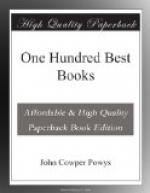It seems to me that nothing is more necessary, in regard to the advice to be given to young and ardent people, in the matter of their reading, than some sort of communication of the idea—and it is not an easy idea to convey—that there is in this affair a subtle fusion desirable between one’s natural indestructible prejudices, and a certain high authoritative standard; a standard which we may name, for want of a better word, “classical taste,” and which itself is the resultant amalgam of all the finest personal reactions of all the finest critical senses, winnowed out, as it were, and austerely purged, by the washing of the waves of time. It will be found, as a matter of fact, that this latter element in the motives of our choice works as a rule negatively rather than positively, while the positive and active force in our appreciations remains, as it ought to remain, our own inviolable and quite personal bias. The winnowed taste of the ages, acquired by us as a sort of second nature, warns us what to avoid, while our own nerves and palate, stimulated to an ever deepening subtlety, as our choice narrows itself down, tells us what passionately and spontaneously we must snatch up and enjoy.
It will be noted that in what we have tried to indicate as the only possible starting-point for adventurous criticism, there has been a constant assumption of a common ground between sensitive people; a common sensual and psychic language, so to speak, to which appeals may be made, and through which intelligent tokens may be exchanged. This common ground is not necessarily—one is reluctant to introduce metaphysical speculation—any hidden “law of beauty” or “principle of spiritual harmony.” It is, indeed, as far as we can ever know for certain, only “objective” in the sense of being essentially human; in the sense, that is, of being something that inevitably appeals to what, below temperamental differences, remains permanent and unchanging in us.
“Nature,” as Leonardo says, “is the mistress of the higher intelligences”; and Goethe, in his most oracular utterances, recalls us to the same truth. What imagination does, and what the personal vision of the individual artist does, is to deal successfully and masterfully with this “given,” this basic element. And this basic element, this permanent common ground, this universal human assumption, is just precisely what, in popular language, we call “Nature”; that substratum of objective reality in the appearances of things, which makes it possible for diversely constructed temperaments to make their differences effective and intelligible.




